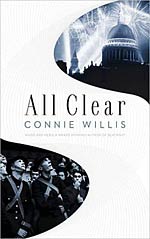
![]() gallyangel
gallyangel
1/24/2014
![]()
All Clear by Connie Willis
The story of the novel's publication goes something like this (or at least, it's what I've heard. I don't know for sure if it's true.)
When Willis presented her novel to her publisher, this 1100+ page monster (a War and Peace of Time Travel, set in WWII's London) the publisher promptly told her that it needed to be cut in half, that it had to be published as two novels. It was cost prohibitive to publish as one book. Willis must have agreed since we now have Blackout and All Clear. This presents us with problems right from the start line. All Clear is not a novel, but the back half of the book that Blackout is the front part of. All Clear, standing by itself, has issues.
To me, where the publisher split the novel in half, seems rather arbitrary. And there is no attempt to bring a reader up to speed in All Clear. It's just, here we are, off you go.
I, of course, made the fundamental mistake of reading Blackout several years ago and waited so long to get to All Clear. So I came to All Clear with the general notion of what's going on: WWII, time travelers, concerns of changing history, lost historians, that sort of thing. But who everyone in the book is, and how they all relate and their time lines, were all faint recollections. And there was no refresher at the start of the book, just jump into it.
This is complicated by the multiple story lines, which follow multiple times. We're in 1940, 1944, 1945, 2060. Jumping around all over the place. And with not remembering very well, it was a bit confusing.
My best piece of advise is that you make the commitment to read both books, back to back, as if it's one novel. That's the way I believe it was conceived in Willis's mind, so that's the way we should be reading it. And then you'll avoid the problems I had.
Now, as to the novel itself, it's classic Willis. What can go wrong, will go wrong. She excels at character driven novels in which her actors say and do exactly the wrong thing at the worst possible time, for the wrong reasons, which they, of course, justify to themselves. While at the same time, they're paradoxically the right things to be doing. It's her style. She writes almost like a river which is never straight; she always meanders. If a person needs to walk into a building, with Willis, three things will undoubtedly happen before he can go across the parking lot, up the stairs, and through the door. This leads to a story which is exhaustively and meticulously plotted and with an ending that is neatly tied up. Neat, Yes; Gotten to Quickly, No. I would sometimes shout "get on with it already", but that's just my own impatience. I did appreciate the Agatha Christie subtext (and her cameo). Just as Christie excelled at putting all the clues in front of you, but you don't know who the murderer is because you're looking at the clues from the wrong way round, Willis does the same thing. All the clues to the time travel problems are there, but the characters are coming at them from the wrong way round. This is time travel after all and you have to wrap your head around its subtleties. If you can't, you're lost.
If you're a Willis fan, it's a must. If you're a time travel fan, buck up to the length and go for it. It does reward by emerging one in the world of the Blitz. And it does reward with the complexities of time travel (as Willis understands them). In fact, before I read Willis's biography, I'd thought she was English. (She certainly sets a lot of her novels over there.) Her humor, her pacing, her knowledge of detail all suggested that to me. She lives in Colorado, born and bred if wikipedia is to be believed. That certainly says something about her skill as a writer.